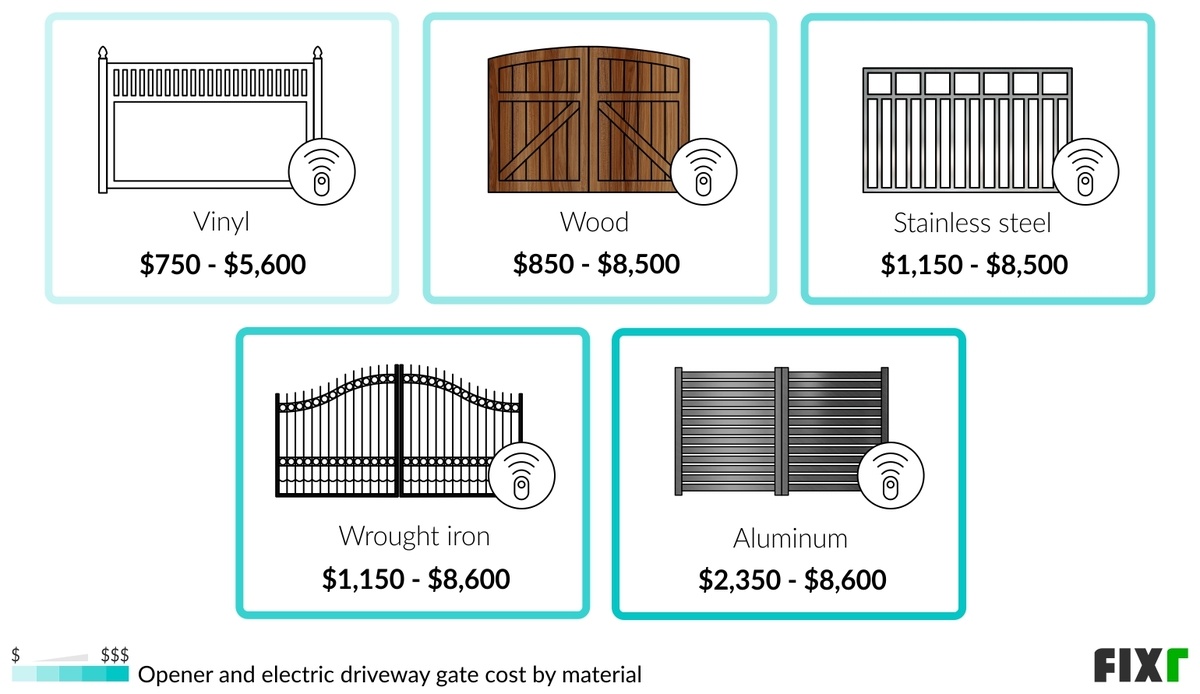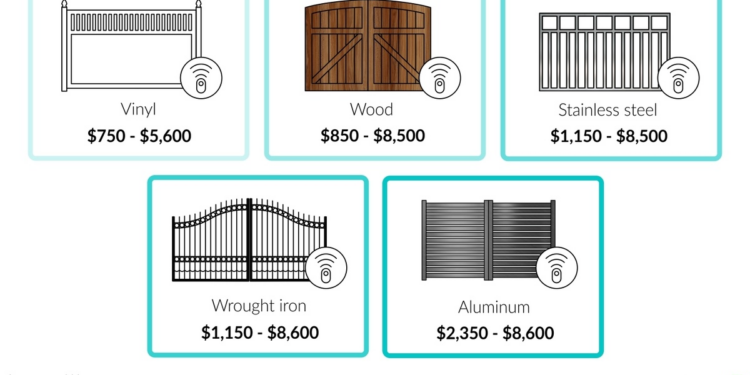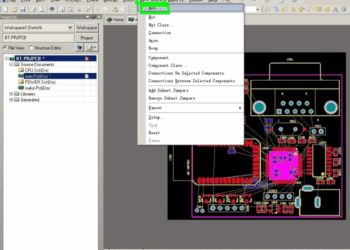Exploring the world of driveway gate cost estimation unveils a myriad of factors that influence the final price tag. From material choices to installation considerations, this comprehensive guide delves deep into the realm of driveway gates, shedding light on the often overlooked aspects that impact the overall cost.
As we navigate through the details of materials, installation costs, maintenance, and more, you'll gain a clearer understanding of what goes into determining the cost of a driveway gate.

Factors Affecting Driveway Gate Cost Estimation
When estimating the cost of a driveway gate, several factors come into play that can influence the final price. Understanding these factors is crucial for homeowners looking to install a driveway gate that fits their budget and needs.
Materials Impacting Cost Estimate
The choice of material for your driveway gate is a significant factor in determining the cost. Different materials come with varying price points and maintenance requirements. Common materials used for driveway gates include:
- Steel: Known for its durability and strength, steel gates are often more expensive but offer excellent security.
- Aluminum: Lightweight and rust-resistant, aluminum gates are a more affordable option compared to steel.
- Wood: Wooden gates provide a classic look but may require more maintenance over time, affecting the overall cost.
Size Influence on Overall Cost
The size of the driveway gate plays a crucial role in determining the overall cost of the installation. Larger gates require more material, labor, and possibly reinforcement to support their weight. Factors such as the width and height of the gate will impact the cost estimate significantly.
Additional Features and Cost Implications
Automation and security systems are popular additional features for driveway gates that can enhance convenience and safety. However, these features come at an extra cost and should be factored into the overall budget. Automation systems like remote controls or keypad entry can increase the price, while security features such as cameras or intercoms add another layer of expense to the project.
Material Options for Driveway Gates
When choosing a material for your driveway gate, it's important to consider factors such as durability, maintenance requirements, cost, and aesthetic appeal. Below, we will discuss the most common material options for driveway gates: wood, wrought iron, aluminum, and steel.
Wood
Wooden driveway gates are popular for their natural look and warmth. They are durable if properly maintained, requiring regular staining or painting to prevent rotting or warping. The cost range for wooden gates can vary depending on the type of wood used, but generally falls in the mid to high range.
Wrought Iron
Wrought iron driveway gates are known for their strength and durability. They require minimal maintenance, with occasional painting to prevent rust. Wrought iron gates can be more expensive upfront due to the material and craftsmanship involved, but they offer a classic and elegant look.
Aluminum
Aluminum driveway gates are lightweight, durable, and resistant to rust. They are low maintenance, only requiring occasional cleaning. Aluminum gates are typically more affordable than wrought iron gates and offer a sleek and modern appearance.
Steel
Steel driveway gates are sturdy and long-lasting, providing excellent security for your property. They require minimal maintenance, with occasional painting to prevent rust. Steel gates can be on the higher end of the cost spectrum, but they offer a high level of security and a contemporary look.Consider the architectural style of your home when choosing a material for your driveway gate.
Wood gates are well-suited for traditional or rustic homes, while wrought iron gates complement Mediterranean or Victorian-style residences. Aluminum and steel gates are versatile options that can work well with modern or minimalist architectural designs.
Installation Costs and Considerations
When it comes to installing a driveway gate, there are several factors that can influence the overall cost. One of the key elements to consider is the installation process itself, including the labor costs involved. Additionally, the terrain of the property where the gate will be installed can also impact the complexity of the installation and, consequently, the total cost.
Typical Installation Process
Installing a driveway gate typically involves several steps, including site preparation, gate assembly, post installation, and automation setup. The process may vary depending on the type of gate and the specific requirements of the property. Professional installers will ensure that the gate is securely in place and functions properly
.
Terrain and Complexity
The terrain of the property can greatly affect the complexity of the installation process. Properties with uneven ground, slopes, or obstructions may require additional work to properly install the gate. This could involve excavation, leveling, or additional support structures, all of which can increase the labor and material costs.
Labor Costs vs. Material Costs
In terms of cost breakdown, labor costs typically make up a significant portion of the total installation cost. Skilled labor is required to install the gate correctly and ensure that it operates smoothly. Material costs, including the gate itself, posts, automation components, and any additional features, also contribute to the overall cost.
It's important to factor in both labor and material costs when estimating the total expense of installing a driveway gate.
Maintenance and Repair Costs
Regular maintenance is essential for ensuring the longevity of your driveway gate and preventing costly repairs in the future. Different types of driveway gates require specific maintenance tasks to keep them functioning properly.
Maintenance Tasks for Different Types of Driveway Gates
- Wooden Gates: Regularly inspect for signs of rot or insect damage. Sand and repaint or reseal as needed to protect against weathering.
- Steel Gates: Check for rust and apply a rust-resistant coating as necessary. Lubricate hinges and moving parts to prevent corrosion.
- Aluminum Gates: Clean with a mild detergent and water to remove dirt and debris. Inspect for any dents or scratches that may need repair.
Impact of Regular Maintenance on Longevity and Costs
Regular maintenance not only extends the lifespan of your driveway gate but also helps in avoiding costly repairs. By addressing small issues early on, you can prevent them from escalating into major problems that require expensive fixes.
Repair Scenarios and Associated Costs
- Replacing a damaged wooden gate panel: $200 - $500 depending on the size and material of the panel.
- Fixing a malfunctioning automatic gate opener: $300 - $600 for repairs or adjustments to the motor or sensors.
- Repairing a bent steel gate: $150 - $400 for straightening and reinforcing the affected area.
Cost Comparison: DIY vs. Professional Installation
When considering the cost of installing a driveway gate, one of the main decisions you'll need to make is whether to tackle the project yourself as a DIY endeavor or hire professionals to do the job. Each approach comes with its own set of cost implications, risks, and benefits.
DIY Installation
Opting for a do-it-yourself installation can potentially save you money on labor costs. However, it's essential to consider the following factors:
- DIY installations may require purchasing or renting specialized tools, which can add to the overall cost.
- Improper installation could lead to additional expenses for repairs or replacements down the line.
- Time commitment and potential setbacks should also be factored in when choosing the DIY route.
Professional Installation
While hiring professionals for the installation of your driveway gate can come with a higher upfront cost, there are several advantages to consider:
- Professional installers have the expertise and experience to ensure the job is done correctly the first time, potentially saving you money in the long run.
- Warranties and guarantees offered by professionals can provide added peace of mind and protection for your investment.
- Professional installation can save you time and effort, allowing you to focus on other tasks.
Cost-Saving Tips
Regardless of whether you choose to install the driveway gate yourself or hire professionals, there are ways to save on costs:
- Compare quotes from multiple installers to find the best value for your budget.
- Consider pre-fabricated gate options to reduce customization and labor costs.
- Opt for durable materials that require minimal maintenance to avoid future expenses.
- Regularly maintain your driveway gate to prevent costly repairs or replacements in the future.
Conclusive Thoughts
In conclusion, the journey through the intricacies of driveway gate cost estimation has provided valuable insights into the various elements that shape the final price. Armed with this knowledge, you're better equipped to make informed decisions when considering the installation of a driveway gate.
Quick FAQs
What factors can affect driveway gate cost estimation?
Factors such as materials used, size of the gate, and additional features like automation and security systems can impact the overall cost.
Which material offers the best durability for driveway gates?
Steel is known for its durability and strength, making it a popular choice for driveway gates that require longevity.
Is DIY installation of a driveway gate cost-effective?
While DIY installation may seem cost-effective initially, hiring professionals ensures proper installation, potentially saving money on repairs in the long run.
How often should maintenance tasks be performed on driveway gates?
Regular maintenance tasks should be performed at least annually to ensure the longevity and functionality of the driveway gate.
What are the average repair costs for driveway gates?
Repair costs can vary depending on the type of gate and the extent of the damage, ranging from minor repairs to complete replacements.












